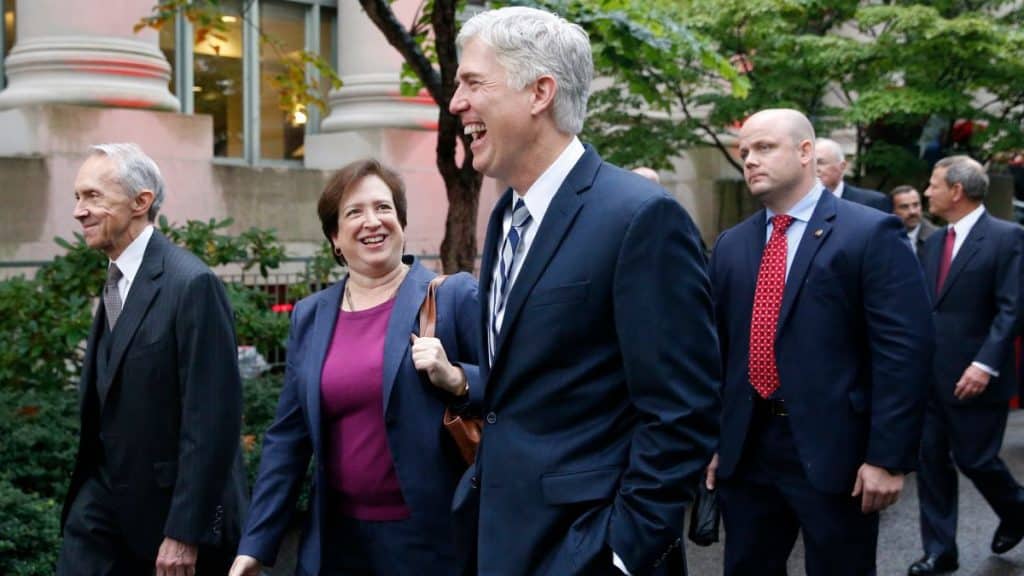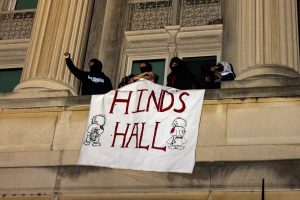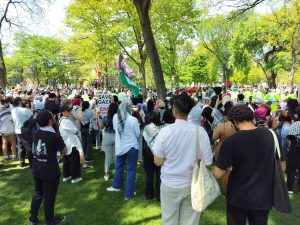The New York Times published a long report and a podcast about a years-long campaign by religious fanatics to influence the U.S. Supreme Court. Rob Schenk, once a leader of the anti-abortion movement, coordinated this lobbying effort. Since he broke with his misogynist views, Schenk has revealed how his network got advanced notice of important rulings.
In order to influence the court, he explained, it is important to speak the judges’ language. When you address them, “it’s Mr. Justice, not Judge or Justice Thomas.” Further, “anyone with you is introduced to the Justice, not the other way around.”
Combine such speech patterns with the silly outfits and the even sillier titles (“Justice,” as if this person were the earthly manifestation of the abstract concept…), the personal connections to far-right activists and fundamentalist religious cults, and this does not seem like an even vaguely democratic institution. Doesn’t it seem more like a feudal court, or perhaps Game of Thrones cosplay?
And yet, these nine people have the final word on the basic rights of everyone living in the United States in 2022.
What Is It Good For?
The Supreme Court stands at the top of one of three branches of the U.S. regime, the self-proclaimed “greatest democracy in the world.” This august institution finds itself in a historical crisis, with just 25 percent of Americans expressing confidence in the nine judges — an 11 point drop in just one year. The reason is obvious: the court’s far-right majority decided to cancel a basic democratic right that had been on the books for 50 years.
The Supreme Court’s present crisis is laid bare by recent leaks. An anonymous insider sent the draft opinion overturning Roe v. Wade to the press. Schenck, the former anti-abortion leader, has now revealed how the judges were previously leaking information to their anti-abortion friends. These revelations highlight an interesting feature of a nominally democratic institution: it’s supposed to function in total secrecy. This is just one of many mechanisms intended to isolate the court from political pressure. The “Justices” are appointed by the Senate — the less democratic house of the Congress — and remain in office as long as they choose. The only way to remove them is via impeachment with a super-super-majority. (The last time this was even attempted was in 1805!) While the judges are expected to follow ethics rules, there is no enforcement mechanism, so they can accept gifts from lobbyists or rule on cases about the criminal actions of their family members.
Today’s far-right court is absurdly unrepresentative of people living in the United States. Catholics make up 22 percent of the population, but 66 percent of the court. And while around two-thirds of people believe in the right to abortion, only one-third of the judges do.
The Supreme Court is often presented as part of the system of “checks and balances” intended to make democracy work. Democracy means the rule of the people — a democracy needs to ensure that the popular will gets translated into state policy. But it’s not just the overturning of Roe v. Wade that shows that the court has a very different purpose.
If the people are supposed to make the laws, why shouldn’t it be the people who decide how those laws are implemented? So why is a judicial caste separate from the people necessary? In other words, who exactly is being “checked” and what exactly is being “balanced?”
We are living in a bourgeois democracy, with an emphasis on the first word. This system was designed to protect the interests of the enslavers in the landed gentry and the urban capitalists. The so-called “framers” — the enslavers who wrote the U.S. Constitution — were explicit about this: too much democracy, they realized, would allow landless peasants to seize the property of large landowners. Certainly they did not want enslaved Black people to participate in democracy. The new state needed various mechanisms to maintain power in the hands ofthe ruling class, from disenfranchisement to the direct creation of bodies, in the words of James Madison, “to protect the minority of the opulent against the majority.” One such body is the Supreme Court.
Amateur Historians
The court’s main function, in its own view, is to review laws passed by the Congress or decisions made by the Executive — two bodies elected in semi-democratic ways — and determine if they are compatible with the Constitution. The current majority of the court aims to apply the Constitution as its authors intended at the time (“originalism”). This idea runs contrary to basic democratic norms.
To start, how could one possibly know what enslavers from the late eighteenth century would think about current political questions? People can and do claim that George Washington and Alexander Hamilton would have stood for every conceivable political position. As we saw in their opinion to overturn Roe v. Wade, the judges act like amateur historians, trying to show how their opinion is supported by random laws at random times in the distant past. As a professional historian, I find this deeply offensive. This is not a legal science but rather a religious ritual: the robed priests are interpreting the holy texts that we mortals cannot possibly understand!
You might also be interested in: The Class Character of the American Constitution
But more importantly, even if we could know with certainty what George Washington or Alexander Hamilton would have thought about a woman’s right to choose, who cares? Why should the preferences of a handful of wealthy landowners from more than two centuries ago have more weight than the preferences of people today? This is a recipe for a kind of semi-secular theocracy, not a democracy. The current “Chief Justice” (!) says it clearly:
If the court doesn’t retain its legitimate function of interpreting the Constitution, I’m not sure who would take up that mantle. You don’t want the political branches telling you what the law is, and you don’t want public opinion to be the guide about what the appropriate decision is.
In other words, John Roberts sees his own function as counterposed to democracy, or has he calls it, “public opinion.”
Minority Rights
The Biden Administration has refused to call for even the most basic reforms to the Supreme Court — they have limited themselves to establishing a toothless commission — as they are worried about destabilizing one pillar of the capitalist regime. Even the reforms under consideration, such as adding additional justices, would do nothing to change the court’s fundamentally undemocratic nature. Bourgeois liberals, while they might not like the current court, argue that the institution has an important role to play in protecting minority rights against “mob rule.”
The only minority the drafters of the Constitution were interested in was the “minority of the opulent,” that is, themselves. But hasn’t the Supreme Court, at least in the second half of the twentieth century, played a progressive role in pushing back against segregation or legalizing gay marriage?
No. What the Supreme Court has done, on occasion, is react to mass movements of oppressed people fighting for their rights. The judges have offered concessions to these movements to prevent them from destabilizing the entire system. It’s not like the judges, back in 1973, studied the ancient parchment with a particularly large magnifying glass and discovered a woman’s right to bodily autonomy there. They responded to a feminist movement that was breaking laws en masse.
Even the court’s most progressive decisions, such as Brown v. Board of Education, did not go beyond “public opinion,” i.e., the democratic will of the majority. In reality, Congress had passed laws against segregation in 1875 which were subsequently nullified by the Supreme Court. So, at its very best, the Supreme Court has only undone damage it previously did to the democratic process.
Some of the most democratic phases of U.S. history have been when the Supreme Court was the weakest. When presidents like Abraham Lincoln or Franklin D. Roosevelt set out to expand democratic rights — not out of the kindness of their hearts, but because revolution was in the air — they faced fierce opposition from the judiciary. Lincoln and FDR were only successful because they repeatedly attacked the Supreme Court for its undemocratic nature. As Lincoln said in his first inaugural address:
If the policy of the government, upon vital questions, affecting the whole people, is to be irrevocably fixed by decisions of the Supreme Court, the instant they are made, it is plain that the people will have ceased to be their own rulers, having turned their government over to the despotism of the few life-officers composing the Court.
Abolition
There are numerous well-meaning liberal proposals to reform the Supreme Court. This would theoretically be possible by reinterpreting the Constitution, thus allowing Congress to limit the court’s powers or increase the number of judges. As socialists, we naturally support all steps towards greater democracy. But the Supreme Court has always been a despotic institution designed to keep democracy in check. The only meaningful democratic reform is to abolish it.
We socialists also call for the abolition of the Electoral College, the Senate, and the imperial Presidency — all institutions conceived to prevent “mob rule,” which is how the aristocrats and capitalists who founded the United States referred to democracy.
A single assembly, elected by all people living in the United States, without any “checks” or “balances,” would provide an immeasurably more democratic process. Representatives would need to be directly elected and also instantly recallable by their voters, and not earn more than an average worker. All judicial and executive functions need to be under democratic control. Using the example of the Paris Commune of 1871, we should fight for all legislative and executive functions to be concentrated in one elected body, while legal decisions must be made by juries made up of working people.
It is noteworthy that right-wingers in the United States are increasingly moving away from any claim to democracy (“we’re a republic, not a democracy”). They point out that democracy offers no protection for property rights. If the majority truly decides, then couldn’t the majority decide to take the means of production away from the tiny minority who control them now?
As socialists, we think that if democracy means anything, it means that the people decide what happens with society’s wealth. At the moment, we are witnessing how a platform used by millions of people has been taken over by a single right-wing idiot, just because this particular idiot controls billions of dollars. We are in favor of democratic control of Twitter, the media, the means of production, and everything else in society. Real democracy is fundamentally incompatible with capitalist property.











